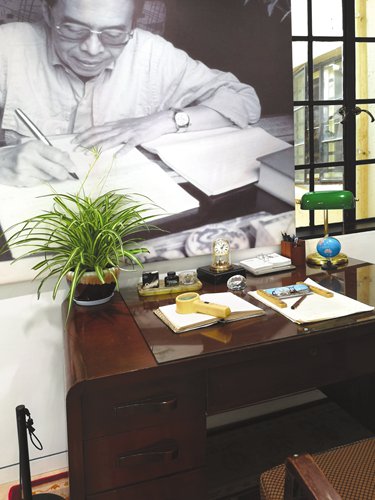HOME >> ARTS
New 22-volume collection gathers the complete works of China’s most famous Russian-to-Chinese translator
By Chen Xi Source:Global Times Published: 2019/7/15 18:13:59

A display in the Cao Ying Study in Shanghai Photo: IC
It took Chinese translator Cao Ying two decades to translate all the works of Leo Tolstoy into Chinese. Now this huge achievement as well as Cao's other translations have been collected together for the first time in The Complete Translations of Cao Ying, which hit bookstores on Friday.A release ceremony for the 22-volume collection was held at the Shanghai Library that afternoon.
More than 100 people attended the event to commemorate Cao, one of China's most famous Russian-to-Chinese translators.
Remarkable feat
Cao Ying, literately "grass baby," was the pen name of Sheng Junfeng. According to Sheng's daughter, Sheng Shanshan, her father always compared himself to a small fresh blade of grass, which seems small but is full of life energy.
Sheng was born in Ningbo, East China's Zhejiang Province in 1923. In 1941, he took part in translating a magazine jointly run by the Communist Party of China (CPC) and Tass, the largest news agency in the Soviet Union, and later another magazine called Soviet Literature and Art that was founded by the CPC in 1942.
"He first learned Russian from an old Russian lady and studied very hard. He later was able to speak Russian as perfectly as a real Russian," Ren Rongrong, a good friend of Sheng's now in his late 90s, once said in an interview with Chinese media site wenweipo.com.
After the foundation of the People's Republic of China in 1949, Sheng became a full-time translator, going on to translate many works from Soviet writers. After the Cultural Revolution (1966-76), he devoted himself to the complete works of Leo Tolstoy's novels, a feat that took him 20 years to finish.
"Mr. Sheng was an outstanding contemporary Chinese translator. He devoted his whole life to translating a large number of classic works of Russian literature, and built a bridge that brought brilliant Russian literature to Chinese readers," Xu Zhenya, a member of the Shanghai Translation Association, told Chinese media The Paper.
Because of Sheng's great contributions to Russian and Soviet literature, he became the only Chinese to win the Gorky Literature Award, the highest prize for Soviet literature.
Last wish
On October 24, 2015, Sheng died in a hospital in Shanghai at the age of 93.
"I have done a lifetime translation, but I don't feel that I ever experienced success. I only pursued one thing in my life, that is, I am just a man trying to do things as seriously as I can."
According to Sheng Shanshan, when her father was a child, he often saw his father, who was a doctor, treat patients for free. These acts of kindness gradually influenced his thoughts on life.
"My mom had three ambitions before her death, which was opening the Cao Ying Study, establishing the Cao Ying Foundation and Translation Literature Award, and publishing The Complete Translations of Cao Ying. The previous two have been completed, and now the last one has come true," she said at the opening ceremony.
"I remembered Sheng once told me that Leo Tolstoy spent seven years completing War and Peace and revised it eight times. As a translator, he needed to read it at least a dozen times. According to him, he read War and Peace 12 times and spent another six years translating it into Chinese," Zhao Lihong, the vice president of the Shanghai Writers' Association, told the Global Times.
Sheng once said that a translator is not a "voice tube," nor a "translation machine." Literary translation needs to have emotional resonance, because only when people are touched emotionally can they experience the original work's atmosphere. He noted that he firmly believes that a good translation will allow foreign readers to have the same feelings and reactions as native readers.
At the event, Chen Zhi, the president of the Shanghai Literature and Art Publishing House, told the Global Times that in order to completely immerse himself in War and Peace, Sheng wrote the names, identities and personalities of all 559 characters in the novel on separate cards so he could study each and every one.
Difficult task
Publishing a complete collection of all his works was one of Sheng's final wishes. However, this was no easy task for the Shanghai Literature and Art Publishing House, as the translator's personal writings were scattered throughout numerous newspapers and magazines.
In order to fully demonstrate Sheng's literary translation achievements and his personal discourse on Russian and Soviet literature and translation issues, the publishing house first began working with Sheng and his family in 2014. After years of organizing and editing his translation works, all his writings have been contained in a 22-volume collection.
"No matter how hard life was, he never gave up his translation work. During the editing process, we too were deeply impressed by Mr. Sheng's incredible focus," Chen said.
According to a report from The Paper, the entire set contains more than 10 million Chinese characters. Twelve of the 22 volumes contain his translations of Leo Tolstoy's novels; seven volumes are translations of the writings of Mikhail Sholokhov, who won the 1965 Nobel Prize in Literature, and Russian Romantic writer Mikhail Lermontov; one volume covers Sheng's personal works in Russian; one volume is a Russian grammar book compiled by Sheng; and one volume contains his translated articles published in various newspapers and magazines over the years.
Newspaper headline: Monumental achievement